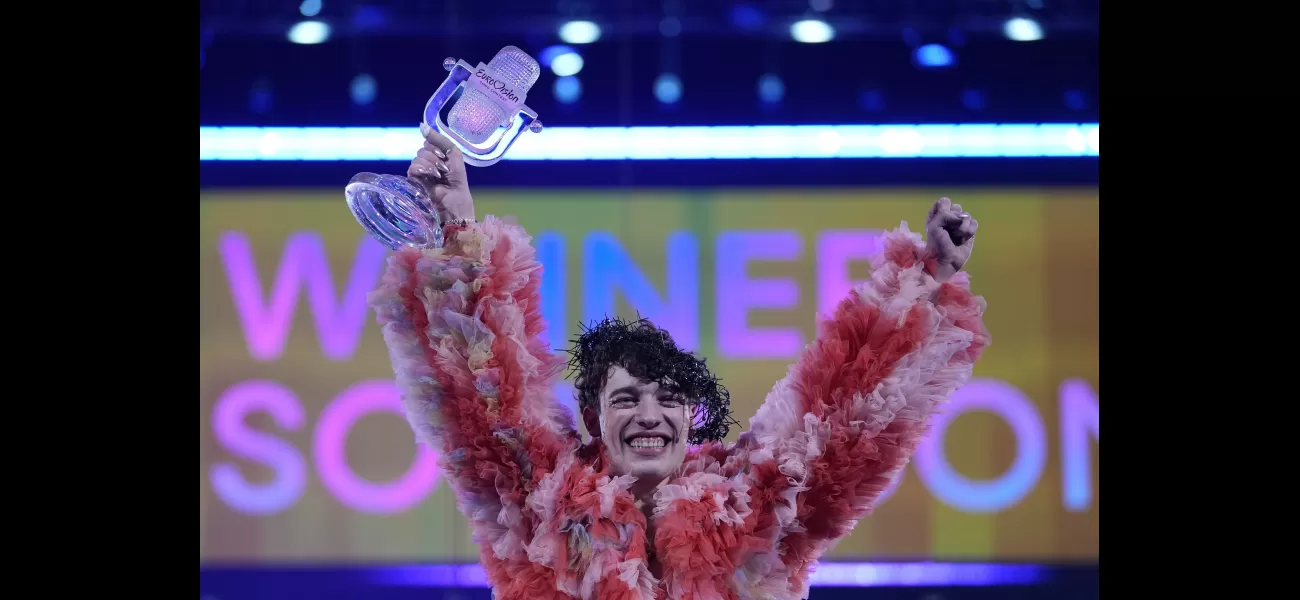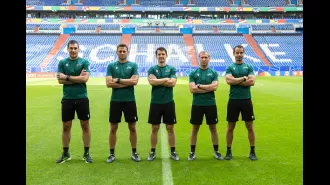Swiss contestant Nemo triumphs at Eurovision.
Swiss singer Nemo won Eurovision with a gender identity anthem, The Code, blending opera and rap.
May 11th 2024.

Nemo, a talented singer from Switzerland, has just been declared the winner of the 68th Eurovision Song Contest with their powerful song, The Code. This operatic pop-rap piece is not just a celebration of Nemo's musical abilities, but also a tribute to their journey towards embracing their non-gender identity. It was a close competition, with Nemo beating out Croatia's Baby Lasagna for the title by receiving the most points from both national juries and viewers from all over the world. This is a historic moment as Nemo becomes the first non-binary winner of the contest, which has been running since 1956.
After the results were announced, Nemo graciously thanked everyone for their support. They expressed their hope that the Eurovision Song Contest would continue to live up to its promise of promoting peace and dignity for all individuals. Nemo's victory took place in the Swedish city of Malmo, which was a tumultuous year for the pan-continental pop contest. There were large protests against Israel's participation, which overshadowed the feel-good musical celebration and turned it into a chaotic pressure cooker, with the war in Gaza looming in the background.
In fact, just hours before the final, there was a backstage altercation involving Dutch competitor Joost Klein, who was then expelled from the competition. However, this did not dampen the spirits of Nemo and the 24 other finalists who all performed in front of a live audience of thousands and an estimated 180 million viewers worldwide. Each contestant had three minutes to captivate the audience with their catchy tunes and eye-catching performances.
The musical styles were diverse, ranging from rock, disco, techno, and rap. Some even incorporated multiple genres into one performance. This year's contest was held in Sweden, home of last year's winner, Loreen, and half a century after ABBA's iconic Eurovision moment with their song, Waterloo. Although ABBA did not make a personal appearance, their digital "ABBA-tars" from their ABBA Voyage stage show did make a cameo.
As the votes were being cast and counted, a trio of former Eurovision winners, Charlotte Perrelli, Carola, and Conchita Wurst, took the stage to perform Waterloo. It was a nostalgic moment for the fans, and it added to the excitement of the competition. The first performance of the night was by Sweden's own entry, identical twins Marcus and Martinus, with their uplifting song, Unforgettable. This was followed by a powerful tribute to their war-torn country by the Ukrainian duo, alyona alyona & Jerry Heil, with their song, Teresa & Maria.
The lineup was filled with talented artists from various countries, including Germany, Luxembourg, Israel, Greece, Armenia, Britain, and many more. Each performance was unique, and the contestants did their best to win the hearts of the viewers. The contest also welcomed some quirky acts, such as Finland's Windows95man, who emerged from a giant onstage egg wearing minimal clothing, and Ireland's gothic Bambie Thug, who brought a scream coach on stage with them. Spain's Nebulossa even boldly reclaimed a term used as a slur against women in their song, Zorra.
Nemo and Baby Lasagna were the favorites going into the competition, and their performances did not disappoint. While Nemo's song touched on personal and societal issues, Baby Lasagna's Rim Tim Tagi Dim addressed the problem of young Croatians leaving their country in search of a better life. However, this year's Eurovision Song Contest was not just about the music. It also became a platform for protests and dissent, dividing the audience and overshadowing the celebration of Europe's diverse musical tastes.
There were thousands of pro-Palestinian demonstrators marching in the streets for the second time in a week, demanding a boycott of Israel and a ceasefire in the ongoing war in Gaza. The tension and division were palpable, and it was a stark contrast to the inclusive and diverse atmosphere that Eurovision usually promotes. The controversy surrounding Israel's participation also led to the expulsion of Dutch performer Joost Klein after a backstage incident. Despite these challenges, the show went on, and all the artists took the stage for the final.
In the end, it was Nemo who emerged as the winner, and their victory was well-deserved. It was a night filled with powerful performances, and Nemo's message of love and acceptance resonated with the audience. As Loreen, last year's winner, said in an interview, the world may be facing challenging times, but love and inclusivity are the only things that can truly heal the trauma. And that is what Eurovision represents - a community of love and acceptance through music.
After the results were announced, Nemo graciously thanked everyone for their support. They expressed their hope that the Eurovision Song Contest would continue to live up to its promise of promoting peace and dignity for all individuals. Nemo's victory took place in the Swedish city of Malmo, which was a tumultuous year for the pan-continental pop contest. There were large protests against Israel's participation, which overshadowed the feel-good musical celebration and turned it into a chaotic pressure cooker, with the war in Gaza looming in the background.
In fact, just hours before the final, there was a backstage altercation involving Dutch competitor Joost Klein, who was then expelled from the competition. However, this did not dampen the spirits of Nemo and the 24 other finalists who all performed in front of a live audience of thousands and an estimated 180 million viewers worldwide. Each contestant had three minutes to captivate the audience with their catchy tunes and eye-catching performances.
The musical styles were diverse, ranging from rock, disco, techno, and rap. Some even incorporated multiple genres into one performance. This year's contest was held in Sweden, home of last year's winner, Loreen, and half a century after ABBA's iconic Eurovision moment with their song, Waterloo. Although ABBA did not make a personal appearance, their digital "ABBA-tars" from their ABBA Voyage stage show did make a cameo.
As the votes were being cast and counted, a trio of former Eurovision winners, Charlotte Perrelli, Carola, and Conchita Wurst, took the stage to perform Waterloo. It was a nostalgic moment for the fans, and it added to the excitement of the competition. The first performance of the night was by Sweden's own entry, identical twins Marcus and Martinus, with their uplifting song, Unforgettable. This was followed by a powerful tribute to their war-torn country by the Ukrainian duo, alyona alyona & Jerry Heil, with their song, Teresa & Maria.
The lineup was filled with talented artists from various countries, including Germany, Luxembourg, Israel, Greece, Armenia, Britain, and many more. Each performance was unique, and the contestants did their best to win the hearts of the viewers. The contest also welcomed some quirky acts, such as Finland's Windows95man, who emerged from a giant onstage egg wearing minimal clothing, and Ireland's gothic Bambie Thug, who brought a scream coach on stage with them. Spain's Nebulossa even boldly reclaimed a term used as a slur against women in their song, Zorra.
Nemo and Baby Lasagna were the favorites going into the competition, and their performances did not disappoint. While Nemo's song touched on personal and societal issues, Baby Lasagna's Rim Tim Tagi Dim addressed the problem of young Croatians leaving their country in search of a better life. However, this year's Eurovision Song Contest was not just about the music. It also became a platform for protests and dissent, dividing the audience and overshadowing the celebration of Europe's diverse musical tastes.
There were thousands of pro-Palestinian demonstrators marching in the streets for the second time in a week, demanding a boycott of Israel and a ceasefire in the ongoing war in Gaza. The tension and division were palpable, and it was a stark contrast to the inclusive and diverse atmosphere that Eurovision usually promotes. The controversy surrounding Israel's participation also led to the expulsion of Dutch performer Joost Klein after a backstage incident. Despite these challenges, the show went on, and all the artists took the stage for the final.
In the end, it was Nemo who emerged as the winner, and their victory was well-deserved. It was a night filled with powerful performances, and Nemo's message of love and acceptance resonated with the audience. As Loreen, last year's winner, said in an interview, the world may be facing challenging times, but love and inclusivity are the only things that can truly heal the trauma. And that is what Eurovision represents - a community of love and acceptance through music.
[This article has been trending online recently and has been generated with AI. Your feed is customized.]
[Generative AI is experimental.]
0
0
Submit Comment





